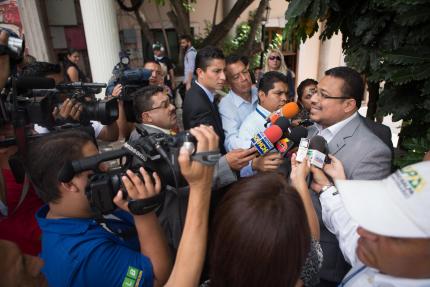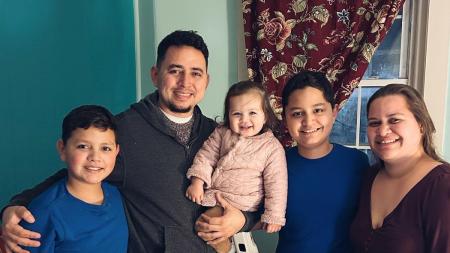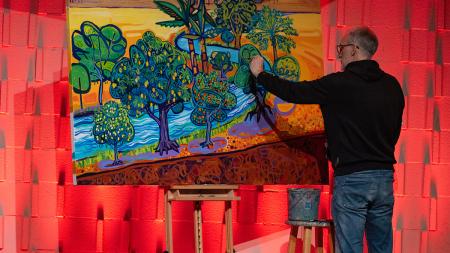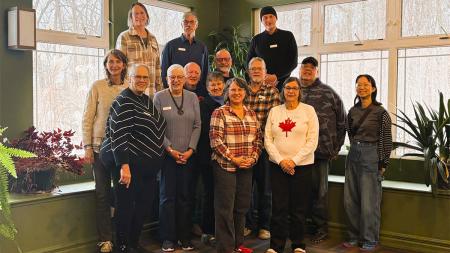Fighting Police Corruption in Honduras

Omar Rivera talks to media.
Association for a More Just Society
Two social justice advocates with connections to the Association for a More Just Society (AJS) have been appointed to serve on a new, three-person commission charged with weeding out police corruption in Honduras.
“This is very exciting. We have been pushing for this for years,” said Kurt Ver Beek, a Calvin College sociology professor and co-founder of AJS, which is recommended for support by the Christian Reformed Church.
“We are now in a position to push the government on the issue of corruption and also make decisions about it.”
AJS has worked for several years on many fronts to fight corruption and inequality in Honduras, which is one of the poorest countries in Latin America and consistently has had one of the highest murder rates in the world.
“We have especially been calling over the last five years for reforms to get the police force cleaned up. There have been a lot of high-level police officers on the payroll of drug traffickers,” said Ver Beek.
In fact, it was recent media revelations linking the police to the assassinations of two top anti-drug enforcement officials that led Honduran President Juan Orlando Hernández to form the commission.
The first media report came from a newspaper in Honduras and was followed by an April 15 account in The New York Times. Their stories were based on case files compiled by police investigators into the two assassinations, the first of which occurred in 2009 and the other in 2011.
“Some brave cops did the investigations and turned what they found over to higher officials who decided to file what they found,” said Ver Beek,
“But then the newspapers published the case files. Soon after, the president called us to be part of the commission.”
Named to what is being called the Commission for Police Purging are Omar Rivera, director of advocacy for AJS, Pastor Alberto Solórzano, president of the Coalition of Honduran Evangelical Churches and a member of AJS’s Honduran board, and Vilma Morales, former president of the Supreme Court in Honduras.
Two of the three members of a technical support committee for the commission are also connected to AJS.
Speaking about the new commission, Omar Rivera said, “This is the time for change, the precise moment of transformation. It is now or never. All sectors are in tune. We cannot fail and we cannot fail Honduras.”
The commission meets daily and has already made important decisions, such as refusing to allow the top 36 police officers implicated in criminal activity to resign with honors, meaning they would get their full pension. In addition several of those officers have been suspended, said Ver Beek.
While being asked to be part of the commission is gratifying and is an opportunity for which AJS has been fighting for years, it is also “scary,” said Ver Beek.
The commission is looking into the activities of police officers who have already shown they are ready to seek revenge and kill those who get in the way.
“People on the commission are worried for their lives. They are being driven around in armored vehicles and have body guards,” said Ver Beek. “Their family members are being moved to safer places.”
Called to serve for a year, the commission could go longer if more time “is needed to restructure and transform the police,” said Ver Beek.
Meanwhile, AJS is putting together a campaign to ask CRC congregations to join with other churches to pray for the success and safety of commission members.
Also, said Ver Beek, they will be asking people to contact U.S. officials and seek their support in the effort to clean up the 14,000 member National Police force in Honduras.
“This issue is quite hot in Honduras now,” said Ver Beek. “The commission is being asked to do its work because the police can’t clean up themselves.”


